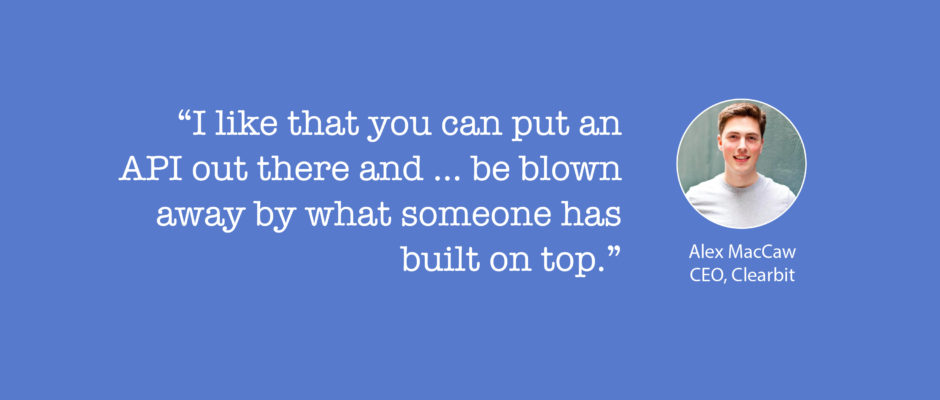You can also check out this interview on the SaaS Open Mic Podcast:
https://soundcloud.com/chartmogul/saas-open-mic-06-alex-maccaw-ceo-clearbit
From Twitter to Stripe to Clearbit
Ed: I know you have an interesting background as a developer, and you’ve done several things and worked for several startups — such as Twitter and Stripe — in a front-end developer role. It’d be great to figure out how you got started with that, and then go through to how you eventually founded Clearbit.
So where did it all start for you?
Alex: Well, if we go back to the beginning, it started when I was in high school. I was just experimenting with coding, teaching myself, and doing a bit of consulting. I couldn’t get good enough math grades to get into a computer science course, so I decided to drop out and do an internship at a startup. And I kind of pity that startup for hiring me because I was so bad at coding! I remember using some particular instance variables instead of local variables because they were a prettier color in the editor… But basically I learned everything at that company. It’s called Reevoo. And then did a bunch more consulting in London.
I got my first taste of San Francisco on a trip here and decided I wanted to come out here permanently. So I figured out how to do the visa situation, managed to get out to San Francisco and I joined Twitter. I worked there for about a year; I was on the revenue team building up all of their ad products. And then I joined Stripe, and I worked on a lot of Stripe’s front-end. I worked on Stripe JS, I made the Stripe checkout, and I wrote all the iOS libraries and a few other things.
 Then after my time at Stripe it was time to do what I actually came out to the city to do, which was my own startup. And I worked through various ideas. I’d like to say I left Stripe to do exactly what I wanted to do, but that’s not the case. I worked on a lifestyle business in the recruiting space for a while, which I sold. Then I came upon the idea of Clearbit. Essentially taking all of the experience I learned at Stripe about working with data APIs but in a slightly different realm: where we’re selling data instead of doing credit card transactions.
Then after my time at Stripe it was time to do what I actually came out to the city to do, which was my own startup. And I worked through various ideas. I’d like to say I left Stripe to do exactly what I wanted to do, but that’s not the case. I worked on a lifestyle business in the recruiting space for a while, which I sold. Then I came upon the idea of Clearbit. Essentially taking all of the experience I learned at Stripe about working with data APIs but in a slightly different realm: where we’re selling data instead of doing credit card transactions.
Ed: Was this something that you knew all along? That the end goal was for you to start a business? Or was this something that appeared to you at some point along that journey?
Alex: It absolutely was a goal the whole time. I worked for the other companies in San Francisco to learn a few things — and I learned a lot, to be honest.
What he learned coding at Stripe
Ed: What were the key things you learned at companies like Stripe and Twitter that weren’t just: how to code better apps? I guess being thrust into companies of that size or with that rate of growth was overwhelming.
Alex: Yes, I certainly learned a lot at Stripe. It’s quite amazing being a part of a rocketship like that — you get to feel something pretty rare. What would I say I learned… that’s a tricky thing.
You know, one thing I learned at Stripe was to make pixel-perfect designs. The designers at stripe are really awesome. And one thing I learned was to get really good at CSS so now I can produce picture-perfect markups. And I’m still the one that does front-end implementation at Clearbit. So, there’s one thing I learned! But it’s kindof hard to talk about specific things I learned because it was just so much.
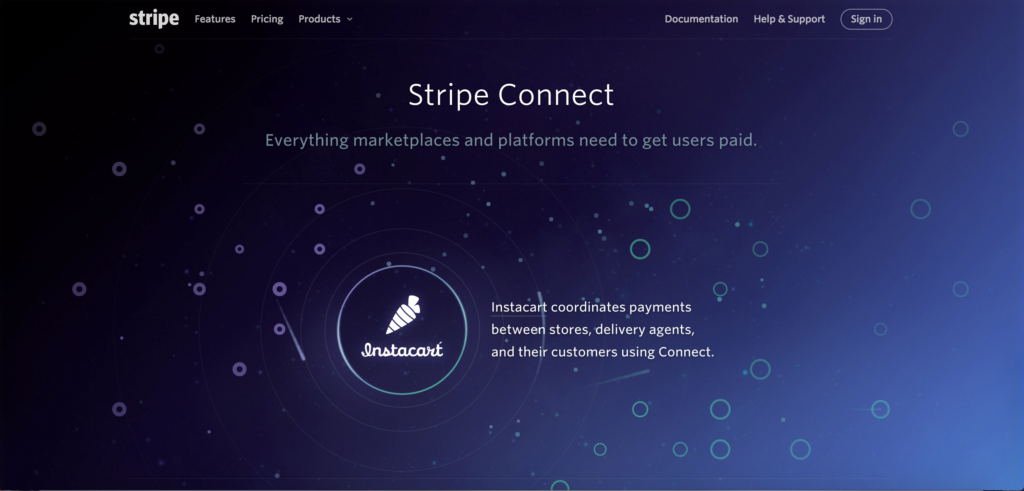
Ed: Something we’re always blown away by at ChartMogul, as a product that integrates and is partnered with Stripe, is the quality of their front-end work, and the stuff they put out on their site, even their blog actually. I don’t know if you were involved with that side of the site at the time, but whoever is doing that now is doing an amazing job!
Alex: Well, I can hardly take credit. I mean, it’s kind of unfair for us, other API startups, to compete with Stripe because they have such an incredible design team that one can only dream of having splash pages as nice as theirs. But I think we [at Clearbit] pull above our weight. Our designs are all done by this guy called Drew Wilson who is fantastic. We contract all those in.
Ed: Do you think that was some of the secret sauce at Stripe, this perfection on the design side that just made everything so visually attractive?
Alex: No. It didn’t hurt! It’s great. But the magic behind Stripe was that there was a real need for a solution to that problem. And they did a few things…
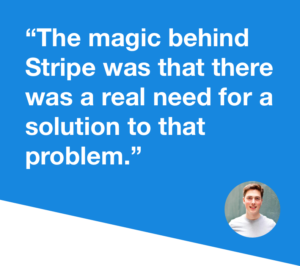 I think Stripe JS was ingenious, the fact that you didn’t need to worry about being PCI compliant or that it was the minimum compliance that you had to implement. That was a stroke of genius. And I think the merchant account — the fact that they would allocate merchant account for you behind the scenes so you could sign up and start accepting payments asap — that was an incredible thing at the time, as well. So for me, it was execution on those fronts. Now, the design is fantastic but I certainly don’t think their success is due to it.
I think Stripe JS was ingenious, the fact that you didn’t need to worry about being PCI compliant or that it was the minimum compliance that you had to implement. That was a stroke of genius. And I think the merchant account — the fact that they would allocate merchant account for you behind the scenes so you could sign up and start accepting payments asap — that was an incredible thing at the time, as well. So for me, it was execution on those fronts. Now, the design is fantastic but I certainly don’t think their success is due to it.
Ed: Was there always a clear vision of where Stripe was going and was everyone behind it, very focused on that goal?
Alex: Yeah, there was. Their motto is: “Increase the GDP of the internet.” I like that, I like that a lot. For us working there, it made a lot of sense.
Ed: Sure. Did you have a mentor there or a figure who guided you through or did you find your own way?
Alex: Mostly my own way. I mean, I certainly learned from my colleagues, but one of the reasons I didn’t do more conventional schooling is because I like teaching myself things.
Going his own way
Ed: Having skipped the Computer Science path, do you think that gives you a different perspective, or perhaps an advantage or maybe even a disadvantage compared to the Computer Science grads that go through the typical route to software engineering at a startup?
Alex: Well, it certainly gives you a lot of first-hand real-world knowledge. I’d be slightly wary of hiring a recent Computer Science graduate unless I’d seen their coding. Because I think a lot of it is pretty abstract. And the languages they teach, like Java for example, aren’t very practical in startup land.
But I keep a pretty open mind when people apply for jobs at Clearbit. For example, I probably couldn’t tell you if any of the guys I work with have degrees or what they’re in. It’s more about what they can do from now on.
Ed: So what was your strategy for getting hired in the first place in a startup? I guess companies like Stripe and Twitter aren’t the easiest to get into — they have a pretty high barrier. So, how did you negotiate or navigate those routes?
Alex: To be honest, I’m very lucky and very fortunate to be working in an industry that doesn’t have a lot of hangups around having a degree. So it wasn’t that hard. For Twitter I think I just DMed Dan Webb, whom I knew, another Brit, who was head of the web team there. And for Stripe, I think I met John [Collison] at some housewarming party. So, it wasn’t tricky, to be honest, because there’s a huge amount of demand for good engineers out here. Visa wise it was tricky. They just don’t usually let people in without degrees.
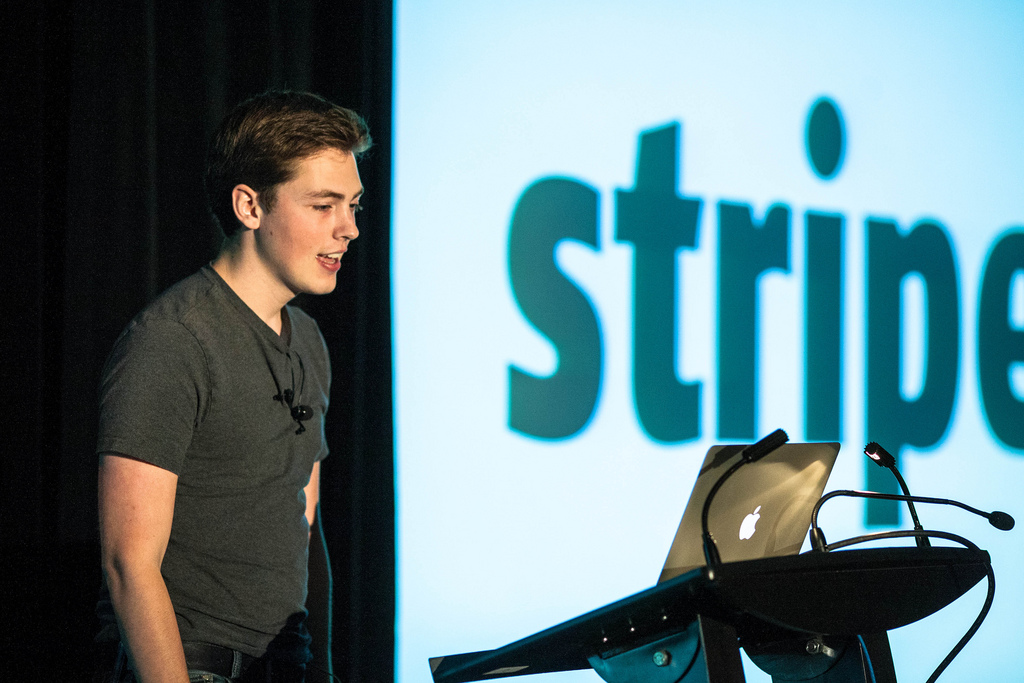
How he got the US visa, and managed to travel the world in the meantime
Ed: I noticed you took some time out at one point to travel. I remember reading some of your stuff on your blog a while back, and you come across as someone who tends to push themselves in sharing things and creating, also traveling and self-development — and writing about all of it. I was wondering if you could talk a little about your motivation for that and how big a part of your self-development that is.
Alex: It’s core. I love traveling. When I was coming out to the states and organizing the visa, it was the perfect opportunity. Because I managed to get what’s called an O-1 visa. When I was trying to figure out how to get over to the States, there were a few options. The O-1 is probably the best one. But it did require me to demonstrate some kind of extraordinary ability; that’s the criteria for that visa.
So I decided to write a book. I wrote a book for O’Reilly on programming JavaScript apps — actually I wrote two, another on CoffeeScript. So I was like, “Okay I have a contract to write this book. It will maybe take me six months. I might as well do it while I’m traveling and combine all these things at once.” I felt like it was perhaps my last chance to travel aimlessly for a year without anything else I had to think about.
 So I bought a round-the-world ticket, which is actually reasonably priced, and just started traveling. I wrote a lot of the book in South Africa and Southeast Asia. And I ended up going to about 20 countries that year, which was quite excessive. My advice to people on traveling is a little different now. I got a taste of everything but I hardly had two nights in the same bed. But now I have a taste of everything, so I feel I know what I like and what I don’t like, so I can go back to those countries and really immerse myself.
So I bought a round-the-world ticket, which is actually reasonably priced, and just started traveling. I wrote a lot of the book in South Africa and Southeast Asia. And I ended up going to about 20 countries that year, which was quite excessive. My advice to people on traveling is a little different now. I got a taste of everything but I hardly had two nights in the same bed. But now I have a taste of everything, so I feel I know what I like and what I don’t like, so I can go back to those countries and really immerse myself.
Ed: There are so many people out there who have a goal of doing some world travel, particularly after studying or before they move into an intensive career. What are the key bits of advice you’d give to those people? If I wanted to travel the world, what would you tell me?
Alex: My main piece of advice would be: don’t plan it. Have no agenda. Just buy a one-way ticket to wherever you want to start; somewhere in Asia is always a good choice. And just take it day-by-day and see what happens. I wouldn’t worry about traveling alone, I traveled alone for the year. Cost, I mean, if you’re living in San Francisco, traveling is way, way cheaper. And if you’re a programmer you can always contract along the way.
Ed: Is that something you did or were you fully focused on the book?
Alex: I was fully focused on the book. I was fortunate I had a bit of spare cash from consulting gigs. So I could just dedicate myself to that.
Ed: Was the book contract just a means to get a visa to get into the US, or was it something you wanted to do anyway?
Alex: Well it certainly was a book I thought should be written. At the time there had been very little thought put into frameworks — this is even pre-backbone JS. So after working on JS apps and big web apps for a while, and trying to assign NBC architectures to them that I’d been practicing on the server side, I thought there honestly were a lot of practices that could be improved. So I really wanted to write that particular book. And it was great to get the opportunity to do it. It was great career wise. I don’t think it was particularly hard to do… You could probably write a book in the evenings, do it in three months if not less. I found it pretty straightforward. But I certainly didn’t do it for the money; there’s no money it. Ultimately it was a means to getting that visa.
Origin of Clearbit
Ed: So let’s talk about Clearbit. You said you fell upon this problem that existed and the idea of creating Clearbit as a product. It’d be great if you mentioned what the problem is and how you went about solving it.
Alex: So, it was really won out of a lot of the frustrations that I had at Stripe around obtaining high-quality data: either that data didn’t exist, or it was a really crappy API. And I thought I could improve on that. I wanted to work in the API space; I really love working with APIs. I like the fact that you can put an API out there and not know what people will build on it until you finally see something and be blown away by what someone has built on top of your platform. So I knew I wanted to be in APIs and in data.
So let’s make a company that builds data APIs for business. And the best API to start with was the email lookup one. Because practically every company has that problem. This API, you give it an email address and it returns someone’s name, their social handles, their job titles, their location down the city — basically automating a Google search. We don’t return anything more on the personal side than a Google search would, but it’s a very useful API. Then we expanded that by adding company information. Every corporate email has a domain name on it. Just a company’s website is an excellent source of data for us.
So we had those two APIs, and we’ve been adding more and more since then. We’ve added APIs to find new companies, based on technologies. You can say, “Show me all companies in SF that use Stripe and have this many employees.” You can get really granular with your search queries. We have APIs where you can find contacts at different companies, find the best person to get in touch with. We have APIs for what’s called an O-fact check, which is a form of financial compliance. And the idea is that we just keep adding to these. Our forte is APIs and we’re going to keep adding to these business APIs. Whatever our customers demand, essentially.

APIs, Integrations, and the future of SaaS
Ed: Obviously you have a SaaS model, and your customers pay a subscription to get access to this data. It seems to me there’s probably a trend in this Data-as-a-Service model, where you have a product that doesn’t have traditional elements, such as a user interface or anything other than a programmatic interface. Do you think this is a trend that will continue to grow?
Alex: Yes, for sure. We’ve just seen the first company that was API-first IPO, which was Twilio. And this trend is just going to continue to grow. I think APIs are incredibly powerful.
One thing we strongly believe at Clearbit is that you get leaps and advances in technology by basic infrastructure improvements. So we’re just making a really good platform for everyone else to build on. And while on the surface our APIs might not be that innovative, the very fact that they’re there and easy to use, and all in one place, means that people are going to create really exciting businesses on top of them.
Ed: They really are just building blocks. Actually it’s interesting to think how many products you can put together with just integrations of APIs.
Alex: It’s incredible. You see a company like Uber that’s just four APIs: Twilio, Braintree for payment processing, Google Maps, and Checkr for the background processing. Uber wouldn’t be possible without those APIs, especially Google maps. You just can’t innovate on that many fronts as a company. But if those are in place and you can build on top of them, that’s when you can build the world’s biggest company.
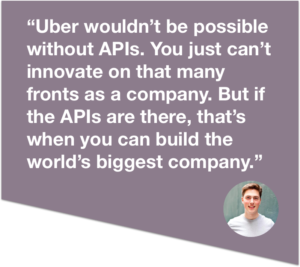 Ed: What do you think about integrations? A lot of tech products right now may offer an API, but they also offer a huge array of integrations with existing services that don’t require any programming work to plug in. Is that a strategy you guys are taking as well?
Ed: What do you think about integrations? A lot of tech products right now may offer an API, but they also offer a huge array of integrations with existing services that don’t require any programming work to plug in. Is that a strategy you guys are taking as well?
Alex: Yeah, for sure. So if we’ve succeeded, then you shouldn’t be thinking of Clearbit. We should just be humming along in the background. And so our data should be wherever you hang out. Our Salesforce integration, for example, is incredibly successful. People love that. And I just view our integration with Salesforce as a Ruby library or a Python library or a Node library. It’s the same thing basically, just a means to an end: getting the data where it needs to be.
Ed: That makes sense. I always just think of Slack, of course. Those guys are pretty much just building a platform based upon the power of offering integrations with almost any service that’s available.
Alex: It’s quite incredible. I think Slack bots are going to be awesome. They have a massive fund dedicated to Slack bots; I think those are going to be huge.
Ed: Yeah, it’s kind of scary and awesome at the same time… So do you envision a future where we are just building not much from scratch anymore and almost everything is built on this micro-service infrastructure?
Alex: Yeah, I mean, everything we do is abstractions upon abstractions. I feel like all human society is like that. And suddenly all programming languages are. So, for us, we’re just making business abstractions better. We’re making them easier to use.
Ed: There’s some risk to building a product on top of existing services that are not owned by yourself. What are the challenges around building a product that is, to a lot of people, part of their infrastructure?
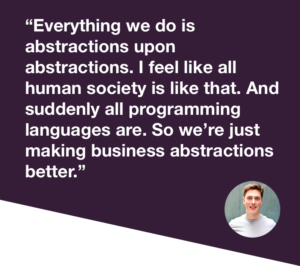 Alex: Well certainly there is some risk there. Especially if that product has no competition. Luckily for a lot of other APIs, there are alternatives. It does weigh heavily on me. We’re often asked — “Clearbit is awesome and we love using it. Please, please don’t ever get acquired or acqui-hired, and then shut the service down!” Because I think people are so burned by all these companies that they rely on doing exactly that.
Alex: Well certainly there is some risk there. Especially if that product has no competition. Luckily for a lot of other APIs, there are alternatives. It does weigh heavily on me. We’re often asked — “Clearbit is awesome and we love using it. Please, please don’t ever get acquired or acqui-hired, and then shut the service down!” Because I think people are so burned by all these companies that they rely on doing exactly that.
So that is something I never want to do. That’s why Clearbit is profitable, and I want to keep it profitable because I want control over my destiny and I want to build this company that lasts.
Building a company that lasts
Marketing and metrics for an API product
Ed: So, how do you market a product that doesn’t have a UI or a user experience as such? Well, I guess you could argue that an API has a user experience, but it’s not a product that is visual in nature. How on earth do you do that?
Alex: Well it comes along with its own set of complexities, and it’s one of the things I’ve learned most about in building this company.
For outbound sales, we don’t sell the API itself. We sell specific integrations. Because that is much easier for people to visualize and understand, and it’s also much easier for us to find a contact at a company who would be interested in using it. For example, a Salesforce implementation will actually go out and sell to the head of sales. Or a Marketo implementation will go out and sell to a head of marketing.
For inbound traffic, it’s mostly about the API. Stripe and GitHub have really pioneered for us, having a great relationship with the dev community. We’re giving back lots of open source, lots of talks, and we have some free APIs as well. Like we have the Logo API so you can turn any domain name into a company logo. So there’s a few different strategies there, but that kind of outlines it.
If anyone is starting an API business, I would say one thing to realize is that the sales cycles are long. Because once you’ve sold to the product side, you have to get the engineering side involved. And even if you are a company like Stripe who is targeting engineers, because engineers can see a direct value from the API, as you grow bigger and bigger, you’re often targeting the business side of the corporation anyway. And so, there is a slow sales cycle, but the flip side of that is that your churn is pretty low.
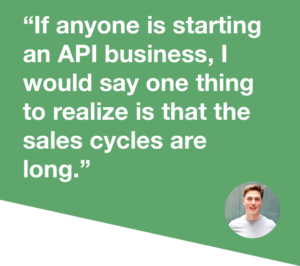 Ed: Yeah, it’s sticky right, if you have an API integrated into your product. It’s interesting. Last week at ChartMogul we launched a fairly big feature, which is an advanced segmentation for our analytics tool that allows people to pipe in data from other sources. Obviously through an API. It’s something we’ve been thinking a lot about over the last weeks: Should we extend our trial or account for much longer sales cycles for people who are integrating this? Also, interestingly enough we just integrated Clearbit as well as a part of this feature!
Ed: Yeah, it’s sticky right, if you have an API integrated into your product. It’s interesting. Last week at ChartMogul we launched a fairly big feature, which is an advanced segmentation for our analytics tool that allows people to pipe in data from other sources. Obviously through an API. It’s something we’ve been thinking a lot about over the last weeks: Should we extend our trial or account for much longer sales cycles for people who are integrating this? Also, interestingly enough we just integrated Clearbit as well as a part of this feature!
Alex: I was excited to see that. That’s awesome!
Ed: It’s really cool actually because it means we can offer it out of the box. Without the customer having to pipe in any data, they have something already to play with. They have the segmentation tool with data that comes from Clearbit, which they can use to segment their customers. I think it’s something where — if you can really make people see the value and the possibilities of what they can do with the data, then it’s pretty much a no-brainer for them. But it’s getting to that point which can be a lot of effort, in some cases.
Alex: Yes, exactly. Getting it in front of people, that’s the hard thing.
Ed: So, as a SaaS business, do you guys use a lot of metrics to measure your growth? Are you a numbers guy, or…?
Alex: To some degree, but I would say the rest of my team — certainly on the sales side — are much better than me. We have a pretty good analytics set-up right now. So we synchronize with Stripe. When you’re doing Stripe integration you could just do stata runtime and have Stripe calculate it, but that’s pretty slow. So we have subscriptions and built out a pretty extensive billing system on our end. And then for analytics, we use a combination of things. We’ve tried pretty much everything. Right now we’re using Kissmetrics for a few things, but we’re moving to a plain redshift. I actually wrote a pretty awesome little open source library that takes S3 logs and turns them into redshift table rows. So that’s something we’re thinking of moving to. Because S3s, you can imagine, can probably take any traffic that you throw at it.
Creating a team and a vision
Ed: How on earth do you still find the time to write open source libraries?
Alex: I…probably shouldn’t, is the answer.
Ed: Do you just dictate them and outsource the development?
Alex: No, I just enjoy coding so much. I mean, I still code a lot of Clearbit. I’m trying to step back a little bit from that, because as CEO your responsibility is to a lot of other things — as well as the engineering.
But I think that technical CEOs have this struggle. Because my first love is programming. And it’s very hard to juggle all the things I like to do.
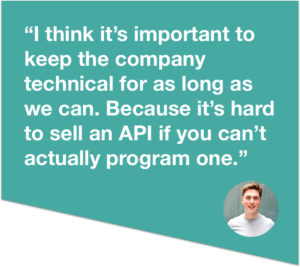 Ed: What does that mean in terms of the team that you’ve hired around you? You obviously still want to stay close to the technical side, so I guess you want to hire a team that complements that.
Ed: What does that mean in terms of the team that you’ve hired around you? You obviously still want to stay close to the technical side, so I guess you want to hire a team that complements that.
Alex: Right. So we have three engineers, and we have three sales engineers. Everyone on the sales side can code, as well. I think it’s important to keep the company technical for as long as we can. Because it’s hard to sell an API if you can’t actually program one… So the team definitely complements my abilities.
The sales side of the company is just fantastic. You might think it’s hard finding a unicorn programmer who can do front-end and backend and a bit of design — but it’s even harder to find someone who’s in sales and who can code. And we’ve got three of those.
Ed: Wow, rare breeds.
Alex: Rare breeds, indeed. So, my time mostly is spent hiring these days. I completed probably the last bit of programming, this connect product that we’re releasing this year, and then I’ll try to focus on less technical things.
What I will say is that I’ve laid a good groundwork. Code quality is very important to me. And whenever you join a company as an engineer, I’d encourage you to look at the code before you join because you see what you’re going to be living with for the next year or so.
We have a really good standard at Clearbit, an awesome service-oriented architecture. It’s incredibly important to the company that engineers can create a new service within five minutes. So if you want your cname, you want your server, all of that stuff — we have a really nice architecture so you can create that very, very quickly. And essentially we just copied Heroku — so you just go “git push production,” and it all works.
 Ed: I guess that’s something that’s attractive to engineers you’re trying to hire, as well, right? If you’re building a super high-quality, great foundational engineering culture, that will help you attract the best people.
Ed: I guess that’s something that’s attractive to engineers you’re trying to hire, as well, right? If you’re building a super high-quality, great foundational engineering culture, that will help you attract the best people.
Alex: Yeah, I hope so. I hope Clearbit, over time, will become renown for its code quality and its artistic approach to code.
Ed: What do the next six months to a year hold for you guys? You said you’re building out this set of APIs. Is that your strategy moving forward, to scale and expand the functionality that you have already?
Alex: Yes. I mean, I think we could build a very substantial business off the APIs that we currently have, and we will definitely be doing that and improving them. But I also think one core idea of Clearbit is to have a whole suite of data APIs and cross-sell people. It’s a lot like AWS’ approach to things. You go in and start using S3, and then you’re like, “What’s this EC2 thing?,” and then you get more and more into the ecosystem. That’s our strategy as well. So we will be focused on building more APIs this year and improving our existing ones.
Ed: That sounds great. Before we go, is there anything that you guys would like to mention? Are you hiring right now?
Alex: We’re hiring. Ideally based in San Francisco, but we have one person in Costa Rica and one person in London, so remote is fine as well.
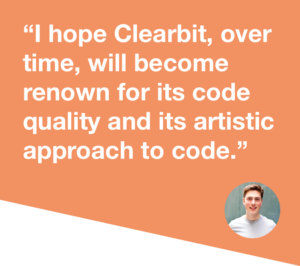 Ed: Actually that’s an interesting point. Is that something you’re open to? Building a remote company? Or do you think there’s too much value having everyone co-located?
Ed: Actually that’s an interesting point. Is that something you’re open to? Building a remote company? Or do you think there’s too much value having everyone co-located?
Alex: I’d rather everybody be in the same room. There’s so much interaction you miss with a remote team. I know a lot of people will disagree with me, but I can’t think of a sports team that was built remotely. I think it’s pretty important.
Ed: Sure. Do you ever look back to the UK or London, or is it so great out there that you’ve never looked back at all?
Alex: Well, I go back once a year or so. But I would never move home. I may move on from the US one day, but I’d never move back to England. From a company building perspective, being in the US helps so much. Being in San Francisco helps so much. So, no, not coming home any time soon.
Share and follow!
Passion for code paves the road to CEO: how @maccaw went from @Stripe to @Clearbit https://t.co/NkNTNeXIGN #SaaS pic.twitter.com/ZX2XoijtV8
— ChartMogul (@ChartMogul) May 18, 2016
